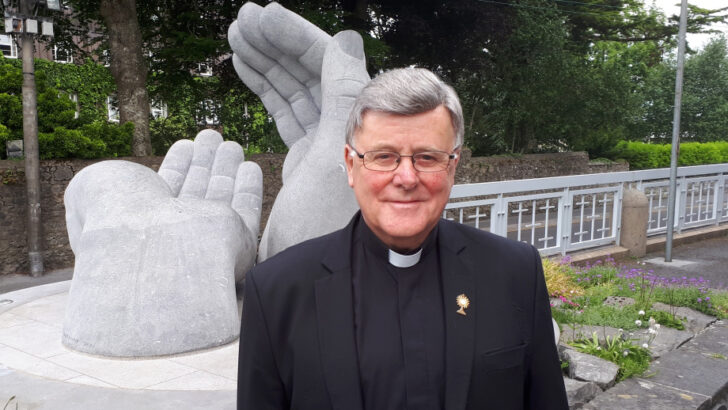With TV and Radio, I yearn for something different, unexpected and original. I rarely get it – predictability is the order of the day.
The interview with Irish Times Religious Affairs correspondent Patsy McGarry on Brendan O’Connor (RTÉ Radio 1, Saturday) fell for the most part into the ‘predictable’ category as the host teased out some issues from Mr McGarry’s new book ‘Well, Holy God’. We got the familiar trawl through the sins of the past with little awareness of the sins of the present. O’Connor started by mentioning the ‘decline of the Catholic Church’, and yes, there has been a decline, though having been at several Sunday Masses recently in different parishes I was struck by the impressive attendances and the diversity of the congregations. He thought young people wouldn’t believe him if he told them about McGarry’s descriptions of station or house Masses – are they so unusual? It ‘almost surprises me’, he said, followed by ‘I kind of remember this Ireland’. Dear fellow Brendan, it’s the same Ireland, we’ve just swapped some abuses for others, made plenty of improvements and lost much of value.
Mr McGarry referred to so many aspects of life being ‘dominated’ by the Church in the past, though with another perspective one could see much of this as service. He described his schooling as being a ‘brutal regime’, referencing corporal punishment which was pervasive at the time – we thought it was normal, part of life, he said. Normal isn’t the same as moral of course, and I remembered early campaigners against it, like Dr Cyril Daly, being regarded as extreme. McGarry remembered being ‘very devout’, a potential priest in a different context, but he started questioning in secondary school and he wasn’t getting answers (at least none that satisfied him) and he now describes himself as ‘agnostic’. He was, and still is, interested in the social teaching of the Church and believes that most clergy were, and still are, ‘decent people’, doing a good job on the ground. He was however angry with the Church authorities, in relation to abuse cover-ups, an anger shared I’m sure by many practising Catholics. He saw just one purpose – the protection of ‘the institution’. Unfortunately, this ‘institutionitis’ infects so many institutions, but you’d expect the Church to have done better. I thought he overstated the criticism when, being overly judgemental, he said that the welfare of children was ‘not a consideration’ for the Archbishops of Dublin prior to Diarmuid Martin.
In relation to Eamonn Casey, he admired the Bishop for his social justice work, e.g. with Trócaire, a Church organisation that, he said, did ‘enormously good work’. Brendan O’Connor seemed either puzzled or peeved when McGarry seemed to stand up for Bishop Casey to an extent – e.g. pointing out that allegations of child abuse against him were not proven – the only case tested did not proceed to a charge. When he wanted to elaborate what the out-of-court settlements meant, O’Connor cut him off rather abruptly, saying that to do so would be disrespectful to victims.
Prayer
The role of prayer in the life of the Church is not at all unrelated to these damaging controversies. The topic was covered by Fr Martin Shanahan on the cleverly named Chatechesis (Radio Maria, Friday) – his first outing in this regular Friday slot. Fr Martin, from Quilty in West Clare, told of how he had been a married man but joined the priesthood after his wife died. He quoted St Therese of Lisieux describing prayer as ‘a surge of the heart … a simple look towards heaven’. I liked his description of prayer as ‘the encounter of god’s thirst with ours’, as he stressed the role of the heart in prayer – if our heart is far from God, the prayers are in vain.
He noted how so often we practice prayer and are asked for prayer in various ordinary situations – for students doing exams, for safe travels. He reckoned we had lost many of our traditional prayer practices, sometimes because of time pressures in our modern lifestyles.
I thought the programme needed to be a bit shorter, but It was good to include texts from listeners, a song – ‘Only in God’ by John Michael Talbot sung beautifully by Hugh and Maria Doherty, and a concluding prayer.
Finally, where have the weekend editions of It Says in the Papers (RTÉ Radio 1) gone to? RTÉ, bring them back!
PICK OF THE WEEK
Songs of Praise
BBC One Sunday, September 1, 1.15pm
To mark 100 years since the BBC first broadcast a service of worship, Pam Rhodes hears inspiring stories from some of today’s Christian broadcasters.
THE MESSAGE OF FATIMA
EWTN Sunday, September 1, 9pm
A condensed version of the EWTN series documenting the astounding miracles at Fatima, where Lucia dos Santos and her cousins, Francisco and Jacinta, were visited by the Blessed Mother.
The US and the Holocaust: A Film by Ken Burns
RTÉ 2 Wednesday (night), September 4, 12.55am
Part 1: After decades of open borders in the United States, a xenophobic backlash prompts the passage of laws restricting immigration. In Germany, Hitler takes power.


 Brendan O’Regan
Brendan O’Regan Fr Martin Shanahan
Fr Martin Shanahan 